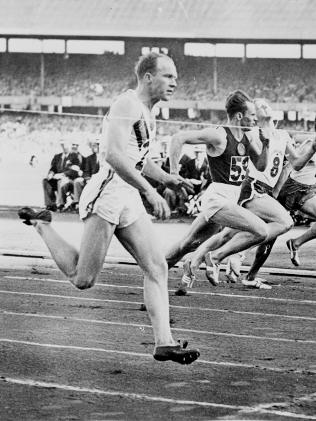
Hector Hogan
Memorial 100yard Sprint
When chunky balding Queenslander Hec Hogan almost won the 100 metres track sprint gold medal at the 1956 Olympic Games it seemed that his days of glory were about to commence. Hogan, the first Australian since John Treloar (Helsinki 1952) to reach the 100 metres final and the first Australian to win a medal in the short sprint, had proven his string of Australians titles and records were not flukes. Tragically, only 4 years later, he was dead from leukaemia, the effects of which had actually begun to show at the 1956 Melbourne Olympics.
Hogan who had earned the nickname of “hustling Hec’ because of his blistering starts and powerful style, first won the Australian 100 yards in 1952, the first of seven Championships wins over this distance. That success earned him selection in the team for the 1954 Vancouver Empire Games. Before the games he won the 100 yards and 220 yards championships, added the national Long Jump title and ran the last leg in Queensland 4 x 110 yard relay team, which won the Australian Titles. Unfortunately, Hogan pulled a leg muscle while training in the United States before the games and at Vancouver struggled to 3rd in the 100 yards and 5th in the 220 yards, and helped Australia to bronze in the 4 x 110 yard relay.
In 1954 Hogan equalled both the World 100 yards record of 9.3 sec and the World 100 metres record of 10.2 giving him confidence going into the 1956 Melbourne Olympics. He almost stole the show in the 100 metres final, bursting from the blocks to lead Americans Bob Morrow and Thane Baker through 50 metres, only to surrender the lead to Morrow with 15 metres to run, and then be pipped by Baker for 2nd place as they lunged for the tape. Hogan also competed in the 200 metres, not his best distance, and was eliminated in the second round. He also ran in the 4 x 100 metres relay team which won its heat in a fast time but was run out in the semi final. Hogan never competed in another Olympic Games but represented Australia in the 1958 Commonwealth Games at Cardiff. It was evident Hogan was under strain though he never admitted to illness. Well below form, he failed to qualify for the final of the 100 yards but helped Australia win a bronze medal in the 4 x 110 yard relay. The following year Hogan visibly deteriorated but carried on as though he was suffering from a common cold, never disclosing what he already suspected. When he failed to qualify for the final in the 1959 Australian 100 yard championship, an event he had won for the past 7 years, he announced his retirement.
Hogan moved to Bowen in North Queensland where he became a publican. It was while living in Bowen that he was enticed out of retirement to run in a competition in Townsville. Hogan ran third over the 100 yards being beaten by local athletes Gerald Edgley and Ray Whyte. It was to be his last competition.
In early 1960 he was admitted to hospital suffering from leukaemia and died in September as the Olympic Games were being held in Rome.
Athletics North Queensland recognises and honours Hec Hogan’s achievements each year by conducting the Men’s Hector Hogan Memorial 100 yard race.
